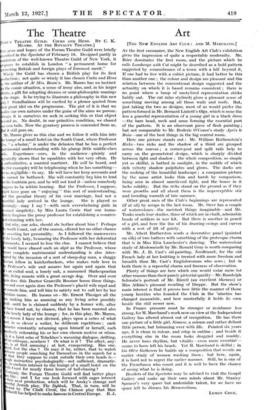The Theatre
ORI:31 THEATRE GUILD. COCKS AND ILENS. BY C. K. MuNit°. AT TILE ROYALTY THEATRE.] II: aims and hopes of the Forum Theatre Guild were briefly eseribcd in the Spectator of February 19. Designed partly in ulation of the well-known Theatre Guild of New York, it mposes to establish in London "a permanent home for teresting British and foreign plays of foremost merit." Wisely the Guild has chosen a British play for its first roduetion ; not quite so wisely it has chosen Cocks and Hens N the author of At Mrs. Beam's. Mr. Munro has an instinct r the comic situation, a sense of irony also, and, in his larger orts, a gift for adapting dreams or semi-philosophic musings the stage. Is he trying to illustrate a philosophy in this new av ? Stendhalians will be excited by a phrase quoted from wir great idol on the programme. The gist of it is that we alize our own natures under the guise of the aims we pursue. lways it is ourselves we seek in seeking this or that object • ond us. No doubt, in our primitive condition, we chased ur own tails. Now the gyratory process is concealed from us, of it still goes on.
Mr. Munro gives us this clue and we follow it with him into lounge of a small hotel On the South Coast, where Professor x, "a scholar," is under the delusion that he has a perfect atrimonial understanding with his plump little middle-class ife. Experience—ours, in the audience—plainly and peatedly shows that he squabbles with her very often. He authoritative, a married martinet. He will be heard, and c (for example) will be telephoning when he has something-- us, negligible—to say. He will have her keep accounts and
e cannot be bothered. She will constantly beg him to lend r his fountain pen, and he will not lend it—unless somebody pens to be within hearing. But the Professor, I suppose, ght have gone on "enjoying" this sort of understanding,
d this peculiar theory of his own marriage, had not a
autiful lady arrived in the lounge. She is played so unningly—may I say ?—with such overwhelming guile in sumed simplicity, by Miss Laura Cowie that one imme- ately forgives the prosy professor for establishing a counter- derstanding with her.
But why, one asks, should she bother about him ? Perhaps South Coast, out of the season, offered her no other chance r asserting her personality. As I followed the manoeuvres f the lovely lady, bemusing the Professor with her deferential lurements, I seemed to lose the clue. I cannot believe that would have chased such an objet as the Professor, whose riser complete matrimonial understanding is also inter- pted by the invasion of a sort of sheep-dog man, a shaggy avian fellow in knickerbockers, who makes rude love to e Professor's wife and assures her again and again that S an exiled soul, a lonely oak, a marooned Shakespearian tic, living remote with a great savage dog. Over and over am does this Doctor Granville Boomer boom these things. .er and over again does the Professor's placid wife repel and console him, and tell him to satiety not to call her by her ristian name. He booms on—Mr. Ernest Thesiger all the me making him as amusing as any living actor possibly uld—urdil he is claimed suddenly by a former wife, after have found out, by chance, that he has been married also the lovely lady of the lounge ; for, in this play, Mr. Munro, a reason I have not divined, plays upon a series of what st, in so clever a writer, be deliberate repetitions ; each raeter constantly returning upon himself or herself, each
elessly reiterating his or her own chosen motive or whim.
IS It a faint echo of Tchekhov's wavering dialogue, drifting,
ir In soliloquy, nowhere ? Or what is it ? The effect, any- 's at first amusing • at last, exasperating. Has one, eed, lost the clue ? Or may it be, rather, that to watch ioere people searching for themselves in the search for a itcrl_lat they suppose to exist outside their own heads is— instructive psychologically—not sufficient, dramatic- Y, to enchain. interest to the lounge of a small hotel on the uth Coast for nearly three' hours Of tail-chasing? ijily the Forum Theatre Guild will find better plays Van ; and 1 for one look forward with eager interest `"eh next production, which will be Ansky's strange and erfal Jewish play, The Dybbuk- That, in turn, will be ed by The Chalk Circle, the Chinese play that Max rdt has helped to make famous in Central Europe. R. J.






























































 Previous page
Previous page